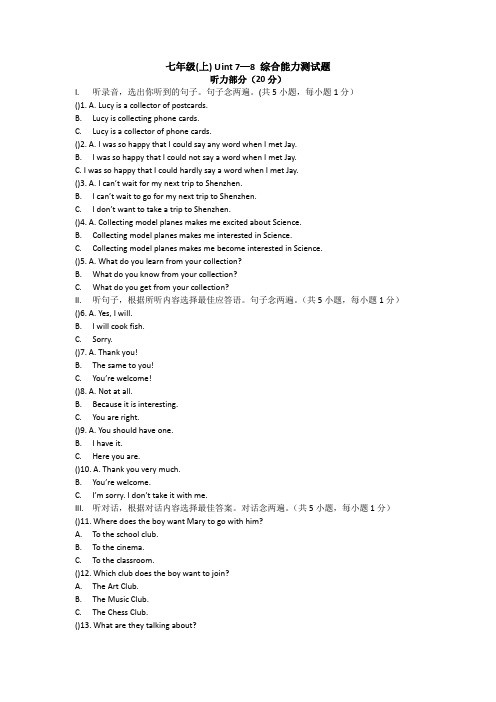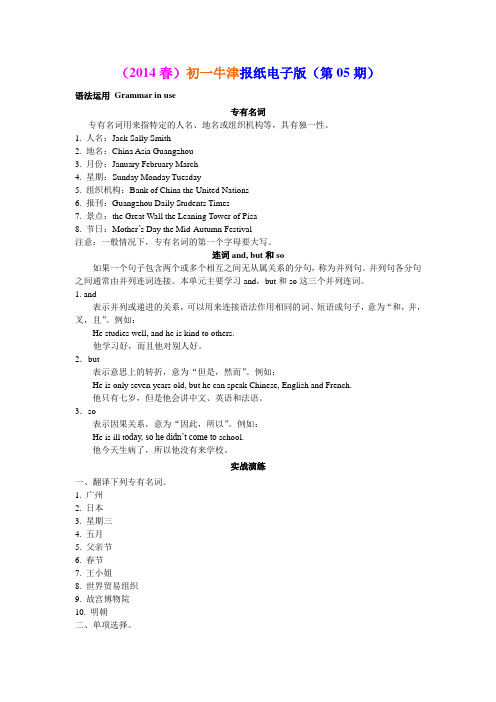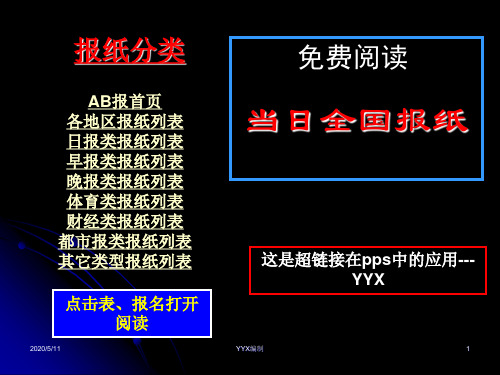七年级报纸电子版·深圳版(第10期)
七年级报纸电子版·深圳版(第29期)

七年级(上) Uint 7—8 综合能力测试题听力部分(20分)I. 听录音,选出你听到的句子。
句子念两遍。
(共5小题,每小题1分)()1. A. Lucy is a collector of postcards.B. Lucy is collecting phone cards.C. Lucy is a collector of phone cards.()2. A. I was so happy that I could say any word when I met Jay.B. I was so happy that I could not say a word when I met Jay.C. I was so happy that I could hardly say a word when I met Jay.()3. A. I can’t wait for my next trip to Shenzhen.B. I can’t wait to go for my next trip to Shenzhen.C. I don’t want to take a trip to Shenzhen.()4. A. Collecting model planes makes me excited about Science.B. Collecting model planes makes me interested in Science.C. Collecting model planes makes me become interested in Science.()5. A. What do you learn from your collection?B. What do you know from your collection?C. What do you get from your collection?II. 听句子,根据所听内容选择最佳应答语。
英语周报七年级牛津(SZY)第10期

第三版 语言知识部分
( B ) 6. — The land is ______.
— We can’ t grow any plants here.
A. rich B. dry C. flat ( C) 7.— Do you have any______abroad? — Yes. My aunt lives in New Zealand. A. friends C. relatives B. neighbours
A. jump第三版 语言知识部分
( C ) 3. If you
something, you hit it with your foot. A. touch B. hold C. kick
第三版 语言知识部分
B. 根据句意, 选择最恰当的词或短语填空。 ( A ) 4. — I think the cat went this way. Look,here are its______. — Follow them and we can find it. A. footprints B. letters C. messages ( C) 5. — It’ s ______today. — How thick the snow on the ground is! A. rainy B. windy C. snowy
第三版 语言知识部分
( B )10 . — What did you do in the winter
holiday? — I took a trip to Suzhou with my parents. A. went fishing B. went travelling C. went skating
第三版 语言知识部分
(2014春)七年级报纸电子版·牛津深圳版(第15期)

(2014春)初一牛津报纸电子版(第15期)综合知识专练( For Unit 3-4)词语狙击Vocabularyn. radio, programme, pet, towel, bottom, airport, pine, branch, root, example, gas, oxygen, furniture, disease, holev. mean, allow, apologize, lead, bark, wake, appear, act, climb, save, discuss, fight, produce, imagine, dig, carryadj. blind, helpful, dark, major, harmful, convenientadv. anywhere, finallypron. nothingprep. against1. arrive at2. by oneself3. lead (sb.) to4. fall asleep5. wake up6. get down7. fire engine8. take in9. come from 10. for example 11. in fact 12. look around 13. (be) made of 14. millions of 15. (be) good for完璧归赵根据句意及首字母提示填写单词, 使句子完整、通顺。
1. My father likes to listen to the r ______in the morning every day.2. If you are hungry, there is an apple at the b______ of my bag. You can eat it.3. The dog suddenly started b______ at us.4. My uncle will arrive at the a _______ in two hours, and then he will fly to Beijing.5. He was so brave that he c _________ to the top of the high mountain at last.6. The old man likes watching TV. He likes all kinds of p_______ on TV.7. Our teacher often gives us some e_______ to explain the difficult words.8. Trees are very important because they can give out o________ for us to breathe.9. There is a lot of new f _______ in his living room, such as the sofa and the table.10. It is d______ outside at night, but the man has to go out to work.中西合璧根据句意及汉语提示填写单词,使句子完整、通顺。
(2014春)七年级报纸电子版·牛津深圳版(第05期)

(2014春)初一牛津报纸电子版(第05期)语法运用Grammar in use专有名词专有名词用来指特定的人名、地名或组织机构等,具有独一性。
1. 人名:Jack Sally Smith2. 地名:China Asia Guangzhou3. 月份:January February March4. 星期:Sunday Monday Tuesday5. 组织机构:Bank of China the United Nations6. 报刊:Guangzhou Daily Students Times7. 景点:the Great Wall the Leaning Tower of Pisa8. 节日:Mother’s Day the Mid-Autumn Festival注意:一般情况下,专有名词的第一个字母要大写。
连词and, but和so如果一个句子包含两个或多个相互之间无从属关系的分句,称为并列句。
并列句各分句之间通常由并列连词连接。
本单元主要学习and,but和so这三个并列连词。
1. and表示并列或递进的关系,可以用来连接语法作用相同的词、短语或句子,意为“和,并,叉,且”。
例如:He studies well, and he is kind to others.他学习好,而且他对别人好。
2.but表示意思上的转折,意为“但是,然而”。
例如:He is only seven years old, but he can speak Chinese, English and French.他只有七岁,但是他会讲中文、英语和法语。
3.so表示因果关系,意为“因此,所以”。
例如:He is ill t oday, so he didn’t come to school.他今天生病了,所以他没有来学校。
实战演练一、翻译下列专有名词。
1. 广州___________________2. 日本____________________3. 星期三__________________4. 五月____________________5. 父亲节__________________6. 春节____________________7. 王小姐__________________8. 世界贸易组织____________________9. 故宫博物院_____________________10. 明朝___________________________二、单项选择。
国内报纸(电子版)

AB 报首页各地区报纸列表日报类报纸列表早报类报纸列表晚报类报纸列表体育类报纸列表财经类报纸列表都市报类报纸列表其它类型报纸列表报纸分类免费阅读当日全国报纸点击表、报名打开阅读这是超链接在pps 中的应用---YYX报纸列表南方都市报,南方都市报电子版,南方都市报电子报,南方都市报数字版扬子晚报,扬子晚报电子版,扬子晚报电子报,扬子晚报数字版京华时报,京华时报电子版,京华时报电子报,京华时报数字版人民日报,人民日报电子版,人民日报电子报,人民日报数字版新民晚报,新民晚报电子版,新民晚报电子报,新民晚报数字版现代快报,现代快报电子版,现代快报电子报,现代快报数字版广州日报,广州日报电子版,广州日报电子报,广州日报数字版新快报,新快报电子版,新快报电子报,新快报数字版济南时报,济南时报电子版,济南时报电子报,济南时报数字版新华每日电讯,新华每日电讯电子版,新华每日电讯电子报,新华每日电讯数字版晶报,晶报电子版,晶报电子报,晶报数字版羊城晚报,羊城晚报电子版,羊城晚报电子报,羊城晚报数字版武汉晚报,武汉晚报电子版,武汉晚报电子报,武汉晚报数字版中国证券报,中国证券报电子版,中国证券报电子报,中国证券报数字版重庆晚报,重庆晚报电子版,重庆晚报电子报,重庆晚报数字版都市女报,都市女报电子版,都市女报电子报,都市女报数字版长江商报,长江商报电子版,长江商报电子报,长江商报数字版东南快报,东南快报电子版,东南快报电子报,东南快报数字版深圳晚报,深圳晚报电子版,深圳晚报电子报,深圳晚报数字版都市快报,都市快报电子版,都市快报电子报,都市快报数字版南国早报,南国早报电子版,南国早报电子报,南国早报数字版钱江晚报,钱江晚报电子版,钱江晚报电子报,钱江晚报数字版东莞时报,东莞时报电子版,东莞时报电子报,东莞时报数字版文汇报,文汇报电子版,文汇报电子报,文汇报数字版楚天都市报,楚天都市报电子版,楚天都市报电子报,楚天都市报数字版北京晨报,北京晨报电子版,北京晨报电子报,北京晨报数字版南方日报,南方日报电子版,南方日报电子报,南方日报数字版香港文汇报,香港文汇报电子版,香港文汇报电子报,香港文汇报数字版证券时报,证券时报电子版,证券时报电子报,证券时报数字版成都晚报,成都晚报电子版,成都晚报电子报,成都晚报数字版新安晚报,新安晚报电子版,新安晚报电子报,新安晚报数字版新闻晨报,新闻晨报电子版,新闻晨报电子报,新闻晨报数字版合肥晚报,合肥晚报电子版,合肥晚报电子报,合肥晚报数字版生活新报,生活新报电子版,生活新报电子报,生活新报数字版新文化报,新文化报电子版,新文化报电子报,新文化报数字版沈阳晚报,沈阳晚报电子版,沈阳晚报电子报,沈阳晚报数字版燕赵晚报,燕赵晚报电子版,燕赵晚报电子报,燕赵晚报数字版今日早报,今日早报电子版,今日早报电子报,今日早报数字版解放日报,解放日报电子版,解放日报电子报,解放日报数字版上海证券报,上海证券报电子版,上海证券报电子报,上海证券报数字版西安晚报,西安晚报电子版,西安晚报电子报,西安晚报数字版经济参考报,经济参考报电子版,经济参考报电子报,经济参考报数字版今晚报,今晚报电子版,今晚报电子报,今晚报数字版大庆晚报,大庆晚报电子版,大庆晚报电子报,大庆晚报数字版中国计算机报,中国计算机报电子版,中国计算机报电子报,中国计算机报数字版大河报,大河报电子版,大河报电子报,大河报数字版重庆时报,重庆时报电子版,重庆时报电子报,重庆时报数字版深圳特区报,深圳特区报电子版,深圳特区报电子报,深圳特区报数字版城市假日(周报),城市假日(周报)电子版,城市假日(周报)电子报,城市假日(周报)数字版重庆商报,重庆商报电子版,重庆商报电子报,重庆商报数字版郑州晚报,郑州晚报电子版,郑州晚报电子报,郑州晚报数字版北京娱乐信报,北京娱乐信报电子版,北京娱乐信报电子报,北京娱乐信报数字版扬州晚报,扬州晚报电子版,扬州晚报电子报,扬州晚报数字版武汉晨报,武汉晨报电子版,武汉晨报电子报,武汉晨报数字版长江日报,长江日报电子版,长江日报电子报,长江日报数字版鑫报,鑫报电子版,鑫报电子报,鑫报数字版深圳商报,深圳商报电子版,深圳商报电子报,深圳商报数字版华商报,华商报电子版,华商报电子报,华商报数字版洛阳晚报,洛阳晚报电子版,洛阳晚报电子报,洛阳晚报数字版厦门商报,厦门商报电子版,厦门商报电子报,厦门商报数字版南国都市报,南国都市报电子版,南国都市报电子报,南国都市报数字版厦门晚报,厦门晚报电子版,厦门晚报电子报,厦门晚报数字版解放军报,解放军报电子版,解放军报电子报,解放军报数字版(完)。
(2014秋)七年级报纸电子版·牛津深圳版(第02期)

(2014秋)初一牛津报纸电子版(第02期)语法运用Grammar in use特殊疑问句的用法一、特殊疑问句的含义:以特殊疑问词开头,对句中某一成分提问的句子叫特殊疑问句。
常用的特殊疑问词有: who, which, where, when, what time, what, how many, how much, how old, why等。
二、特殊疑问句的构成:特殊疑问词+一般疑问句+?例如:1. What is your name? 你的名字叫什么?2. Where are you from? 你来自哪里?3. When do you usually get up? 你平时什么时候起床?三、特殊疑问句的基本用法:1. who: 一般用于对人称的提问。
例如: Who is your brother? 你的哥哥是谁?2. where: 一般用于对地点提问。
例如: Where are the apples? 这些苹果在哪里?3. when, what time: 一般用于对时间的提问。
例如: What time is it? 现在几点了?When are you going to Beijing? 你什么时候去北京?4. what: 一般是对人的职业或者事物是什么进行提问。
例如:What does your sister do? 你的姐姐是做什么的?What do you like to do on Sundays? 你星期天喜欢做什么?5. (1) how many: 一般用于对(可数名词的)数量提问。
例如:How many pencils are there in the box? 盒子里有多少支铅笔?(2) how much: 一般用于对(不可数名词的)数量提问。
例如:How much water is there in the bottle? 瓶子里有多少水?注: 用how much, how many提问时, 名词紧跟在其后。
(2014春)七年级报纸电子版·牛津深圳版(第24期)

(2014春)七年级报纸电⼦版·⽜津深圳版(第24期)(2014春)初⼀⽜津报纸电⼦版(第24期)综合知识专练( For Unit 5-6)词语狙击Vocabularyn. drop, journey, quantity, experiment, salt, voice, chemical, pipe, bit, bank, change, electricity, conversation, rule; wire, moment, battery, cooker, fridgev. drop, add, return, form, continue, reply, connect, lock, test, tidy, touchadj. fresh, valuable, foolishadv. onpron. anyoneprep. through1. turn off2. add ... to ...3. a bit4. part of5. pocket money6. be made up of7. dry up8. a packet of9. in a way 10. (be) connected to 11. power station12. washing machine 13. switch off 14. tidy up 15. air conditioner 16. have a shower 17. instead of 18. make sure 19. start a fire 20. safety tips完璧归赵根据句意及⾸字母提⽰填写单词, 使句⼦完整、通顺。
1. The TV is o_______. Please help me switch it off.2. We plan to go to Harbin by air because it’s a long j________ by train.3. Lily works as a hostess in a TV station because she has a sweet v______ and she’s talkative.4. This gold ring is very v_______ and it costs lots of money.5. I’m afraid we can’t go t_______ the forest. We don’t know the way.6. After you finish reading these books, please r_______ them to the library.7. Don’t t_________ these plates. They are made of glass and they are easy to break.8. My family has a lot of home r________, and each of us in my family needs to follow.9. The house is clean and t________. There’s no rubbish on the ground.10. A______ who breaks the law should be sent into prison(监狱)中西合璧根据句意及汉语提⽰填写单词, 使句⼦完整、通顺。
(2014秋)七年级报纸电子版·牛津深圳版(第05期)

(2014秋)初一牛津报纸电子版(第05期)语法运用Grammar in use【一般现在时态】一、含义:1. 表示经常性、习惯性的动作或存在的状态。
例如: I go to the park by bus. 我乘公交车去这个公园。
2. 表示主语的特征、性格、能力、爱好等。
例如: He can dance. 他会跳舞。
3. 表示客观真理。
例如: The Earth goes around the sun. 地球围绕着太阳转。
二、结构:肯定式否定式疑问式回答I work I don’t work. Do you work? Yes, I do. / No, I don’t. You like singing. You don’t like singing. Do you like singing? Yes, I do. / No, I don’t.We often go to the zoo. We don’t often go tothe zoo.Do you often go to thezoo?Yes, we do. / No, wedon’t.They want to have supper. They don’t want tohave supper.Do they want to havesupper?Yes, they do. / No, theydon’t.He (She, It) eats a lot. He (She, It) doesn’teat a lot.Does he (she, it) eat alot?Yes, he (she, it) does. /No, he (she, it) doesn’t.【频度副词及频度副词短语】一、频度副词是用来表示动作频率的词, 包括: often, usually, always, sometimes, seldom, never 等。
- 1、下载文档前请自行甄别文档内容的完整性,平台不提供额外的编辑、内容补充、找答案等附加服务。
- 2、"仅部分预览"的文档,不可在线预览部分如存在完整性等问题,可反馈申请退款(可完整预览的文档不适用该条件!)。
- 3、如文档侵犯您的权益,请联系客服反馈,我们会尽快为您处理(人工客服工作时间:9:00-18:30)。
七年级(上)Unit 3能力测试题听力部分(15分)i.听句子,根据所听内容选择最佳应答句。
句子念两遍。
(共3小题,每小题1分)()1. A. Plant more trees.B. The Earth is important to us.C. The Earth is harmful.()2. A. Too much. B. Yes, there is.C. No, there aren’t.()3. A. What a big bottle!B. Some milk in the bottle.C. It’s a bottle.II.听对话,根据对话内容选择最佳答案。
对话念两遍。
(共4小题,每小题1分)听第一段对话,回答第4-5小题。
()4. Who is Mike?A. Linda’s brother.B. Linda’s cousin.C. Linda’s friend.()5. What language doesn’t Mike speak?A. English.B. Japanese.C. Chinese.听第二段对话,回答第6-7小题。
()6. Why does the river become dirty now?A. A factory puts dirty water into it.B. People throw rubbish into it.C. There are no fish in it.()7. What are they talking about?A. Planting more trees.B. Protecting the river.C. Throwing rubbish.Ill.听短文,根据所听内容选择最佳答案。
短文念两遍。
(共3小题,每小题1分)()8. What can children do at their homes to protect the Earth?A. Take a short shower.B. Help their parents do housework.C. Clean the rooms.()9. Which of the following is NOT mentioned (提及)to protect the Earth at school?A. Planting trees.B. Picking up rubbish.C. Loving the trees and grass in school.()10. Who is the speaking mainly (主要地)for?A. Parents.B. Teachers.C. Students.IV.听短文,根据所听内容补全下列小短文。
短文念两遍。
(共5小题,每空1分)The Earth is our mother. Without the Earth, there is no (11) _________. It gives us enough water, food, (12) _________and so on. I can even say we can only (13) _________on Earth. There is only one Earth (14) _________, so please protect it, and protect our“mother”. We can protectit from little things such as (15) _________and planting trees. So please do it right now for ourselves and our children.笔试部分(85分)第一卷选择题(55分)I.词汇测试。
(10分)i)从下面每小题的A、B、C三个选项中选出可以替换划线部分的最佳选项。
(共5小题,每小题1分)()1. — The Earth is our home. We should protect it.—Right. Let’s begin now.A. make ... cleanB. make ... safeC. make... beautiful()2. — Tom, you must wash your hands before dinner.—OK, Mom. I will.A. canB. shouldC. have to()3. —Is there a large tree next to your house?—Yes. It lives more than 100 years.A. bigB. smallC. long()4. — Could you provide us with some help?—No problem!A. borrowB. giveC. buy()5. — Who pollutes this river?—Some factories. We should call on people to protect the river.A. makes ... dangerousB. makes ... roundC. makes ... dirtyii)根据句子意思,从下面每小题的A、B、C三个选项中选出恰当的词语完成句子。
(共5 小题,每小题1分)()6. If you want to know a __________, you want to know something real.A. factB. lieC. problem()7. If you __________ animals, you make them become dead.A. protectB. killC. bum()8. — There is too much __________ now.—Yes. People should not pollute the Earth.A. energyB. practiceC. pollution()9. —Tom,don’t __________ these old books. We can give them to other children.—OK, Dad.A. throw awayB. look forC. get in()10. — What can we do to protect the Earth?—__________A. Going outside is a good idea!B. We can take our own shopping bags.C. We can go shopping together.II.完形填空。
(15分)阅读下面短文,从短文后所给的A、B、C 三个选项中选出能填入相应空白处的最佳选项。
(共10小题,每小题1.5分)It is very important to deal with (处理)the rubbish in cities. For one thing, rubbish may make a lot of 11. It may pollute the air, the water and the places we 12 in. For another, too much rubbish is 13 for people’s health. In our city, people deal with the rubbish 14. First, people think there are 15 kinds of rubbish. They can 16 the good kind of rubbish again, for example, old newspapers and glass. People put the bad kind of rubbish under the 17. Before the waste water 18 into the river, people make it become 19. People even make laws (法律)against rubbish. But that’s not enough. We all must try our best to 20 rubbish from polluting the Earth. It is important to save our city and our living places.()11. A. field B. money C. pollution()12. A. live B. stand C. arrive()13. A. sad B. bad C. good()14. A. hardly B. earlyC. well()15. A. one B. two C. three()16. A. complete B. throw C. use()17. A. ground B. river C. sea()18. A. finds B. goes C. meets()19. A. clean B. short C. dirty()20. A. like B. help C. stopIII.阅读理解。
(30分)阅读下列短文,从下面每小题的A、B、C、D四个选项中选出最佳选项。
(共20小题,每小题1.5分)AThere is a greedy crocodile (贪婪的鳄鱼). He feels really hungry and he wants to eat something. Then, he sees a little boy. The boy has some chicken in his hand. The crocodile wants to eat both the boy and his chicken.The crocodile says,“Oh, little boy! Could you please give me some chicken?”The boy says, “Oh no, you may eat me.”The crocodile says, “I don’t eat you.”So the boy goes near the crocodile and gives him the chicken. But the crocodile catches his arm. There comes a rabbit. She wants to help the boy. The crocodile wants to eat the rabbit first, so helets the boy’s arm go.At that time, the boy runs away and the rabbit runs away too. At last, the greedy crocodile doesn’t get his dinner.()21. What’s in the little boy’s hand?A. Bread.B. Chicken.C. Tomatoes.D. Carrots.()22. Why does the crocodile let the boy’s arm go?A. Because the boy’s mother comes to help him.B. Because he doesn’t want to eat the boy.C. Because he wants to eat the rabbit first.D. Because he is too tired to eat.()23. What does the crocodile eat at last?A. The chicken.B. Nothing.C. The boy.D. The rabbit.()24. What do you think of the boy?A. Kind.B. Happy.C. Brave.D. Naughty.()25. What can we learn from the story?A.People should work hard to get food.B. Greedy people may get nothing at last.C. People should not talk with others.D. Crocodiles and rabbits are good friends.B()26. What is NOT the writer’s idea about water?A. We drink water every day.B. We use water to clean things.C. We should not waste water.D. There is little water in every place.()27. Why should we NOT drive too much?A. Because cars are dangerous.B. Because cars need much money.C. Because cars waste water.D. Because cars use too much energy.()28. Which of the following is TRUE?A. There is much oil on Earth.B. We should cut down trees to for tee Earth.C. Too much plastic is not good for the Earth.D. We should not use glass bottles and paper bags.()29. What does the passage mainly want to tell us?A. To save energy.B. To protect the Earth.C. To protect trees.D. Not to use plastic.()30. Who is the passage for?A. Everyone.B. Students.C. Factories.D. Parents.CVending machines (自动售机)are very popular now. You can find them here and there. People can buy different things from them, like snacks and drinks. Now we can even buy train tickets and newspapers in some places. In some places, you can get a bottle of Coke from the vending machine, but in others, you can’t. Some vending machines sell cigarettes (香烟). We call them “cigarette machines”. But you can9t see these machines in some places in the United States now. They are not good for children. And only some, clubs have them. Children cannot get into these places.How does a vending machine work? If you want to buy a bottle of Coke, you can find its price (价格)on the machine. Put the money into the machine, and press the button (按按钮)of the Coke, and then you can get your Coke. Vending machines make our life easy and interesting.()31. What can we NOT buy from a vending machine according to the passage?A. Newspapers.B. Coke.C. Train tickets.D. Clothes.()32. Which of the following is TRUE about vending machines?A. All of them in the world are the same.B. Only the United States has them.C. Everyone can’t get cigarettes from them.D. In some places, yon can’t get Coke from them.()33. What does the underlined word “them”refer to (指的是)?A. Parents.B. Children.C. Cigarette machinesD. Clubs.()34. How can you buy a bar of chocolate in a vending machine?①Press the button of the chocolate.②Put money into the machine.③Read the price of the chocolate.④Get your chocolate.A. ①②③④B.①③②④C.③②①④D.③②④①()35. What is the best title for the passage?A. How to buy CokeB. Vending machines in ChinaC. How to get moneyD. Vending machinesDSaving the Earth shouldn’t be so difficult if we can do the following.First, we should take our time. There is no need to hurry. We can walk or ride a bike to work. Second, we should smell the Earth. Open the windows. Turn off the air-conditioner, and at the same time, save the energy.Third, we should enjoy cooking at home and having meals at our dinner table. So we can use our own bowls and chopsticks, not the plastic ones.Fourth, we should spend our weekends and holidays in the park playing games or just riding a bike around.Fifth, we should learn how to make good use of (充分利用)old things in the house, in the garden, or in the kitchen.Lastly, no one really has a mountain or a sea. Don51 throw rubbish here and there.()36. What does the writer think of saving the Earth?A. It should be safe.B. It should be difficult.C. It should be easy.D. It should be happy.()37. What do the underlined words “take our time” mean?A. Be happy.B. Be slow.C. Be fast.D. Be sad.()38. What can we know from the passage?A. Eating at home can help save the Earth.B. Enjoying air outside can help save energyC. Not buying new things can save the Earth.D. Throwing old things away is good for the Earth.()39. How many ideas about saving the Earth are mentioned (提及)in the passage?A. Four.B. Five.C. Six.D. Seven.()40. What is the passage about?A. What the Earth looks like.B. How to enjoy living on Earth easily.C. How to protect the Earth in an easy way.D. How to protect the Earth in an interesting way.第二卷非选择题(30分)IV.连词成句。
